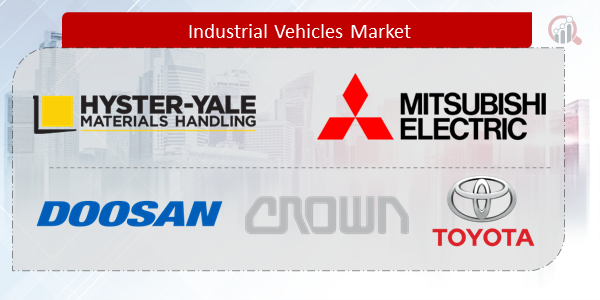Top Industry Leaders in the Industrial Vehicles Market

*Disclaimer: List of key companies in no particular order
Latest Company Updates:
Navigating the Terrain: Competitive Landscape of Industrial Vehicles Market
The industrial vehicles market, encompassing forklifts, tow tractors, aerial work platforms, and more, hums with the constant churn of competition. Established players vie for market share, while new entrants bring fresh perspectives and innovations. To understand this dynamic landscape, it's crucial to dissect the strategies that key players adopt, the factors shaping market share, and the emerging trends that reshape the competitive terrain.
Giants in the Arena:
Dominating the scene are established players like Toyota Industries Corporation, KION Group AG, Mitsubishi Logisnext, Jungheinrich AG, and Crown Equipment Corporation. These companies leverage their extensive product portfolios, robust distribution networks, and brand recognition to maintain their leading positions. Their strategies often revolve around:
Technological Prowess: Investing heavily in R&D, these players prioritize automation, electrification, and advanced safety features to enhance operational efficiency and cater to the evolving needs of customers.
Comprehensive Solutions: Moving beyond mere vehicles, they offer integrated material handling solutions, encompassing software, service packages, and consulting services, establishing themselves as one-stop shops.
Geographic Expansion: With an eye on emerging markets, these giants are establishing manufacturing and distribution footprints in regions like Asia-Pacific and Latin America, capitalizing on the burgeoning demand.
Emerging Challengers:
While established players hold sway, new entrants are carving their niches. Startups like Locus Robotics and Fetch Robotics focus on automation and robotics, offering innovative solutions like autonomous mobile robots and collaborative robots that address specific pain points in warehousing and logistics. Smaller, regional players cater to localized needs with nimble production and customized products, challenging the giants in specific segments.
Market Share Mosaic:
Analyzing market share in this multifaceted landscape requires a multi-dimensional lens. Factors influencing market share include:
Product Mix: Companies with diverse portfolios catering to multiple vehicle types and applications hold an advantage.
Regional Presence: Market penetration in key growth regions like China and India significantly impacts share.
Technological Leadership: Early adoption of cutting-edge technologies like automation and electrification can create a competitive edge.
After-Sales Support: Robust service networks and spare parts availability ensure customer satisfaction and brand loyalty.
Shifting Sands: Emerging Trends:
The industrial vehicles market is constantly evolving, with several trends reshaping the competitive landscape:
Electrification Wave: The shift towards battery-powered electric vehicles gathers momentum, driven by environmental concerns and lower operating costs. Companies like BYD and Doosan Infracore are making significant strides in this space.
Automation Evolution: Automation of material handling processes through automated guided vehicles and collaborative robots is transforming warehouses and factories. Startups like GreyOrange and Geek+ are at the forefront of this revolution.
Connectivity Surge: Integrating industrial vehicles with IoT platforms and AI-powered software is enabling real-time tracking, predictive maintenance, and data-driven optimization, offering valuable insights for improved efficiency and cost reduction.
A Competitive Canvas:
The industrial vehicles market is a dynamic tapestry woven with established players, agile startups, and disruptive trends. To navigate this terrain successfully, companies need to remain adaptable and innovative. Embracing technological advancements, tailoring offerings to local needs, and prioritizing customer-centric solutions will be key differentiators in a market constantly on the move. Understanding the competitive landscape and its driving forces will be crucial for both established players and emerging challengers to claim their share of the ever-evolving industrial vehicles market.
Anhui Heli Co., Ltd (China):
• December 15, 2023: Announced launch of new H-series electric forklift trucks with focus on energy efficiency and performance. (Source: Anhui Heli press release)
Crown Equipment Corporation (US):
• December 7, 2023: Crown unveiled new SC 6000 Series narrow-aisle forklifts featuring advanced automation and operator assistance technologies. (Source: Crown press release)
Hangcha Group Co. Ltd (China):
• December 28, 2023: Announced signing of strategic cooperation agreement with Chinese tech giant Huawei for digital transformation projects. (Source: Hangcha website)
Hyster-Yale Materials Handling, Inc. (US):
• December 22, 2023: HYSTER® brand launched new H4D Series forklift trucks with focus on enhanced operator comfort and safety. (Source: Hyster-Yale press release)
Top listed global companies in the industry are:
Anhui Heli Co., Ltd (China), Crown Equipment Corporation (US), Hangcha Group Co. Ltd (China), Hyster-Yale Materials Handling, Inc. (US), Jungheinrich AG (Germany), Kion Group AG (Germany), Konecranes plc. (Finland), Mitsubishi Nichiyu Forklift Co., Ltd. (Japan), Toyota Industries Corporation (Japan), and Doosan Corporation (South Korea)











